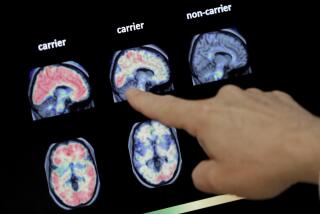‘Good’ cholesterol may also be good at reducing the risk of Alzheimer’s disease, researchers find
- Share via
Here’s yet another reason to watch your cholesterol – the “good” kind may reduce your risk of developing Alzheimer’s disease later in life.
That nugget comes from researchers at the Columbia University College of Physicians and Surgeons in New York. They recruited 1,130 senior citizens from Manhattan (all of them age 65 or older) and took baseline measurements of their cholesterol levels and their neurological states. They also checked to see whether these seniors had a particular mutation in the APOE gene that could increase their risk of developing Alzheimer’s.
They tracked each volunteer for more than four years, on average. During that time, 89 of the seniors were diagnosed as having “probable” Alzheimer’s and another 12 had “possible” Alzheimer’s. Compared to those with the lowest levels of high-density lipoprotein – the good cholesterol commonly known as HDL – volunteers with the highest levels were 60% less likely to be told they had a probable or possible case of Alzheimer’s.
To make it into the “high HDL” category, volunteers had to have more than 56 milligrams of HDL per deciliter of blood. Those in the lowest HDL category had no more than 38 mg per dL of blood. In their analysis, the researchers controlled for the age, gender, body-mass index, education and ethnic groups of the volunteers, along with the type of APOE genes they had and other health conditions like heart disease and type 2 diabetes.
The results weren’t all that surprising. A high level of good cholesterol already has been linked to a reduced risk of carotid artery atheroschlerosis, a condition that can lead to cognitive impairment. Abundant HDL also reduces the risk of stroke, which is associated with a higher risk of Alzheimer’s.
However, only seniors with the highest levels of HDL appeared to benefit from a reduced risk of Alzheimer’s. Those whose HDL was only slightly below the 56 mg/dL cutoff actually saw their risk of the disease rise by 10%. This suggests that there’s a threshhold amount (somewhere above 56 mg/dL) at which the association between HDL and Alzheimer’s risk kicks in, the researchers said.
The results appear in Tuesday’s edition of Archives of Neurology.






